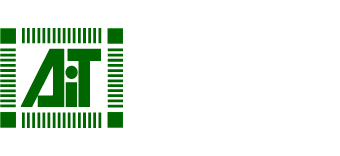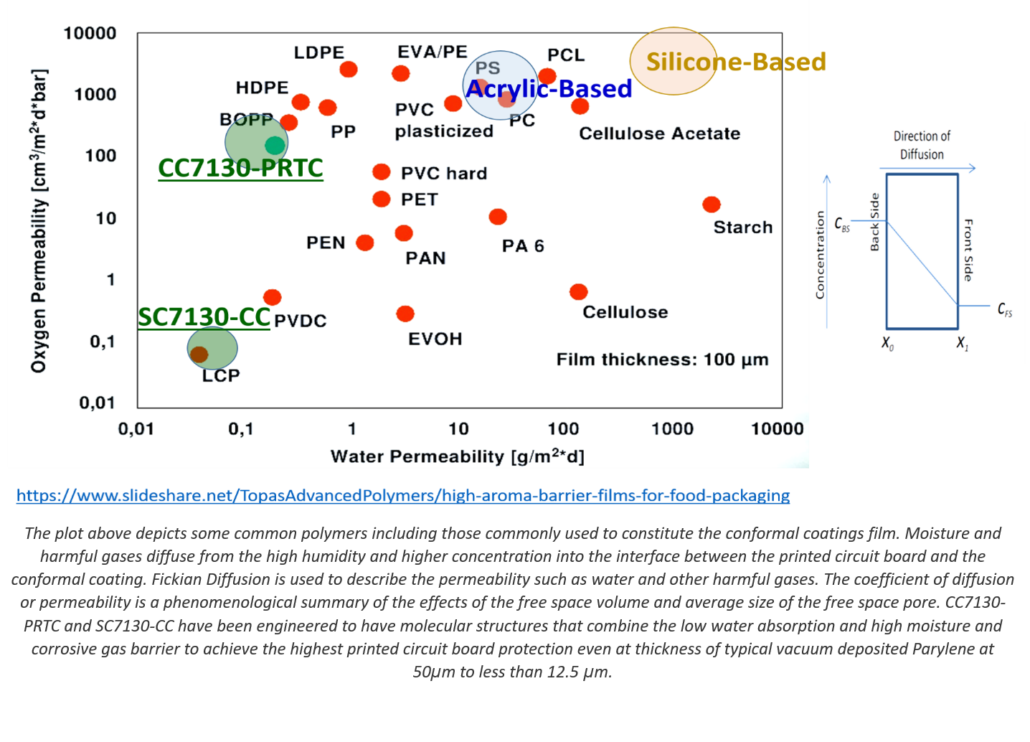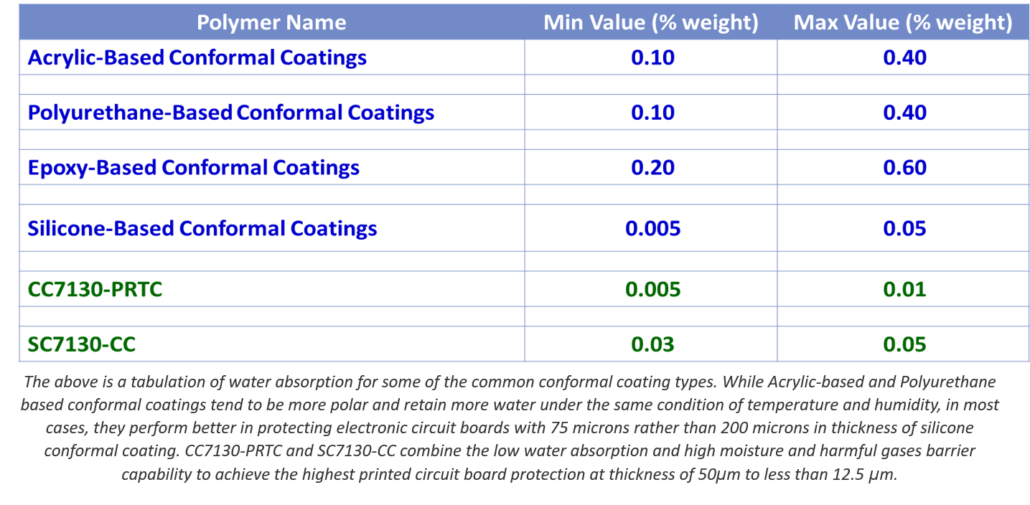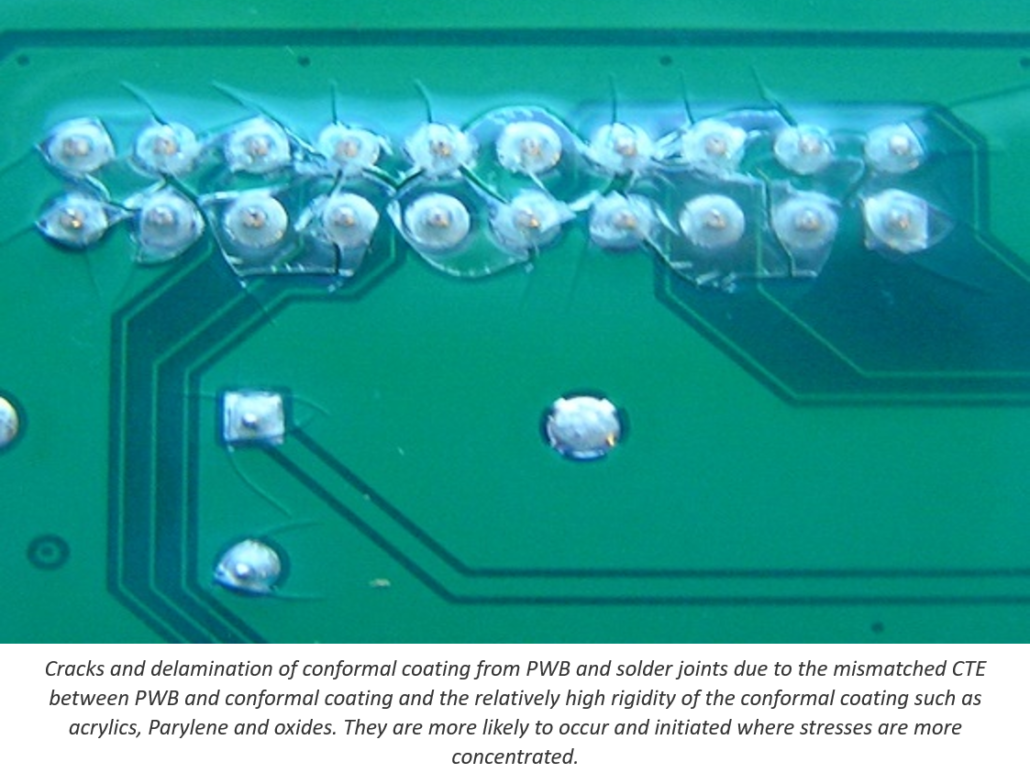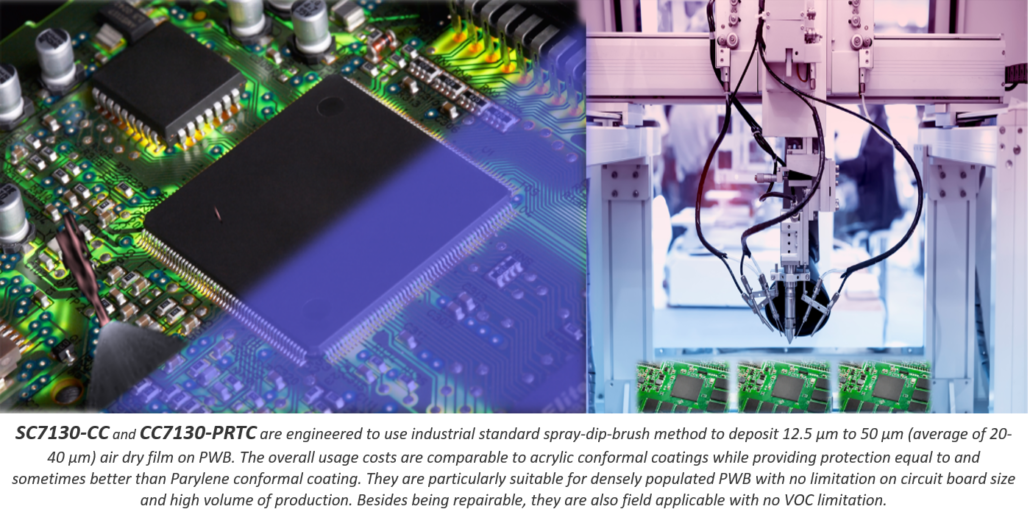Unparalleled Moisture and Corrosive Gases Barrier
with Designed and Engineered Molecular Structure
for Outdoor and Extreme Weather
The basic function for conformal coating on PWB or PCB (printed circuit board) is to provide higher reliability and longer operation life for the electronic device under different environments, including protection against:
Moisture ingression
Salt-fog ingression
Fungi attack
IPC-CC-830C qualifications provide standards of testing against such environmental factors and separately, specifications for electrical insulation. Users must test conformal coatings under the actual usage and operating conditions for their specific applications as outlined below.
- Larger circuit boards mounted with high profile components:
- Larger area circuit boards induce greater interfacial stress with differential thermal expansion between the board and higher rigidity conformal coatings.
- Boards with multiple high profile components introduce corresponding points of stress concentration. Extreme temperature excursions cause the more rigid and non-compliant conformal coatings to crack and delaminate.
- Operating outdoors and in more extreme environments:
- For outdoor applications, exposure to different degrees of industrial gases such as hydrogen sulfide, sulfur dioxide, nitric oxide, carbon dioxide and chlorine are unavoidable. When coupled with high moisture and/or salt-laden spray or fog, the degradation to the circuit boards may be accelerated especially for those circuits with finer pitch and spacing.
- Operating under more extensive temperature cycling, shocks and other stresses:
- Aeronautic electronics are exposed to fast compression and decompression along with extreme temperature swings during landing. Automotive electronics are commonly exposed to low temperatures in northern geographies and quickly rise in temperature after starting. Automotive electronics, digital displays, cellular base stations operating near the coastal areas and marine electronics are exposed to extensive salt-fog and even salt-spray.
See IPC-CC-830C standards test report summaries for FLUOROSEAL SC7130-CC and CIRCUITSEAL CC7130-PRTC
Currently, none of the existing types of conformal coating
meet the requirements for
performance
and/or cost effectiveness in coating deposition.
AI Technology, Inc. has designed and engineered
two new types of conformal coatings
that can be spray-dip-brush coated onto PWB
with thickness of 15 to 40 µm
with protective performance of Parylene.
AIT coatings have now garnered
many proven uses in
extreme aeronautic and high salt-spray environments.
Read our white paper: Designing Polymer Molecular Structure for Conformal Coating for Optimized Printed Circuit Board Protection Against Outdoor and Extreme Elements
These new types of conformal coating have improvements over Parylene type with
flexible molecular structures for:
- delamination prevention
- crack free performance
for large and small boards at the most extreme thermal cycling and shock.
They are also field applicable and repairable.
The novel high moisture and corrosive barrier conformal coatings from AI Technology, Inc. have been designed and engineered to meet the technical challenges of difficult operating conditions including:
- Barrier to prevent penetration of moisture laden with active gases such as hydrogen sulfide, sulfur dioxide, carbon dioxide, and nitrogen dioxide that may become trapped as weak acidic solution at the interface between conformal coating and PWB.
- Barrier to ionic migration in salt-spray and salt-fog conditions, such as required in automotive, industrial, maritime, and aeronautic electronics.
Salt-spray testing, while not used in the IPC-CC-830C qualifications, is an effective test to distinguish whether a conformal coating is adequate to protect the PWB under the long-term exposure to environments near the sea. This stringent testing with salt-spray (simulating extreme salt-fog with condensation) on PWB applies not only to marine electronics, it also applies to aeronautic, industrial, maritime and automotive electronics.
FLUOROSEAL SC7130-CC is modified and engineered fluorinated polymer conformal coating that has been tested by aeronautic users to have an unparalleled advantage over acrylic conformal coating for the applications based on Radio Technical Commission for Aeronautics (RTCA DO 160).
- Flexibility – low modulus with high capability to stretch.
- Flexibility is required to absorb thermal excursion induced interfacial stresses due to the mismatches between tough and high strength conformal coatings with CTE of ~60 ppm/ºC (acrylic and epoxy type) or 35ppm/ºC (Parylene type) and CTE of 18 ppm/ºC for PWB and copper traces.
- Must have the molecular flexibility to absorb and prevent interfacial stresses and stress concentration due to rapid compression and decompression coupled with temperature shock excursions in some aeronautic electronics.
In all electronic conformal coating and packaging applications, interfacial stress and stress concentration are two of the most important considerations for long-term reliability.
In the case of conformal coatings these stresses may be induced from temperature excursions under normal operating conditions different from the coating curing temperature. The printed circuit board substrate is a fiber-glass reinforced epoxy with controlled planar coefficient of thermal expansion (CTE) of 16-20 ppm/ºC to match that of the copper traces used to build the interconnection. In controlling the planar CTE, the Z-axis CTE is >70 ppm/ºC.*
Conformal coating is typically applied as air-dry or vacuum deposited onto the PWB at ambient temperature. CTE is in the range of 55-65 ppm/ºC for acrylic and epoxy based types, and 35 ppm/ºC for the Parylene type. The differential CTE causes strain in the conformal coating bonding onto the stronger PWB and thus induces stress on the conformal coating and stress concentration at sharp interfaces such as around components and solder joints.
In simple terms, the stress induced on the conformal coating increases with:
- increase in differential CTE
- compressive stress increases with temperature excursion below ambient
- tensile stress increases with temperature excursions above ambient.
Compressive stess, tensile stress, and stress concentration also increase with higher modulus of conformal coating. Sometimes thousands of psi in stress are induced. This stress may cause cracks, from micro-and-hairline to large cracks, or even delamination of the conformal coating.*
- Low cost spray-dip-brush deposition method and yet provide Parylene performance in protection in similar thin coating
- While some vacuum deposited conformal coatings such as Parylene have been proven to perform better than typical acrylic types with thinner 12.5 µm to 50 µm coating, the high cost and volume production limitations make their use in wider commercial electronics difficult.
- The new types of conformal coating preferably utilize low cost spray-dip-brush deposition method and yet provide Parylene performance in protection in similar thin coating.
- Ideally, the new solution will improve over Parylene type coating with lower interfacial stress and the ability to repair when needed.
FLUOROSEAL SC7130-CC and CIRCUITSEAL CC7130-PRTC are
new types of conformal coating
that have been tested to have the same performance as Parylene under the IPC-CC-830C standards and categorization.
They have the same thin coating of 12.5 µm to 50 µm and
higher insulation resistance even after extreme moisture exposure.
The molecular structures have been engineered to be stress-free during temperature excursion and thermal shock. These new types of conformal coatings are also capable of
blocking moisture and harmful gas ingress to prevent corrosion for
longer term reliability.
They are applied with
traditional spray-dip-brush method for air-dry transparent coating
and can be field applied and repaired.
See the physical and electrical properties of FLUOROSEAL SC7130-CC and CIRCUITSEAL CC7130-PRTC
